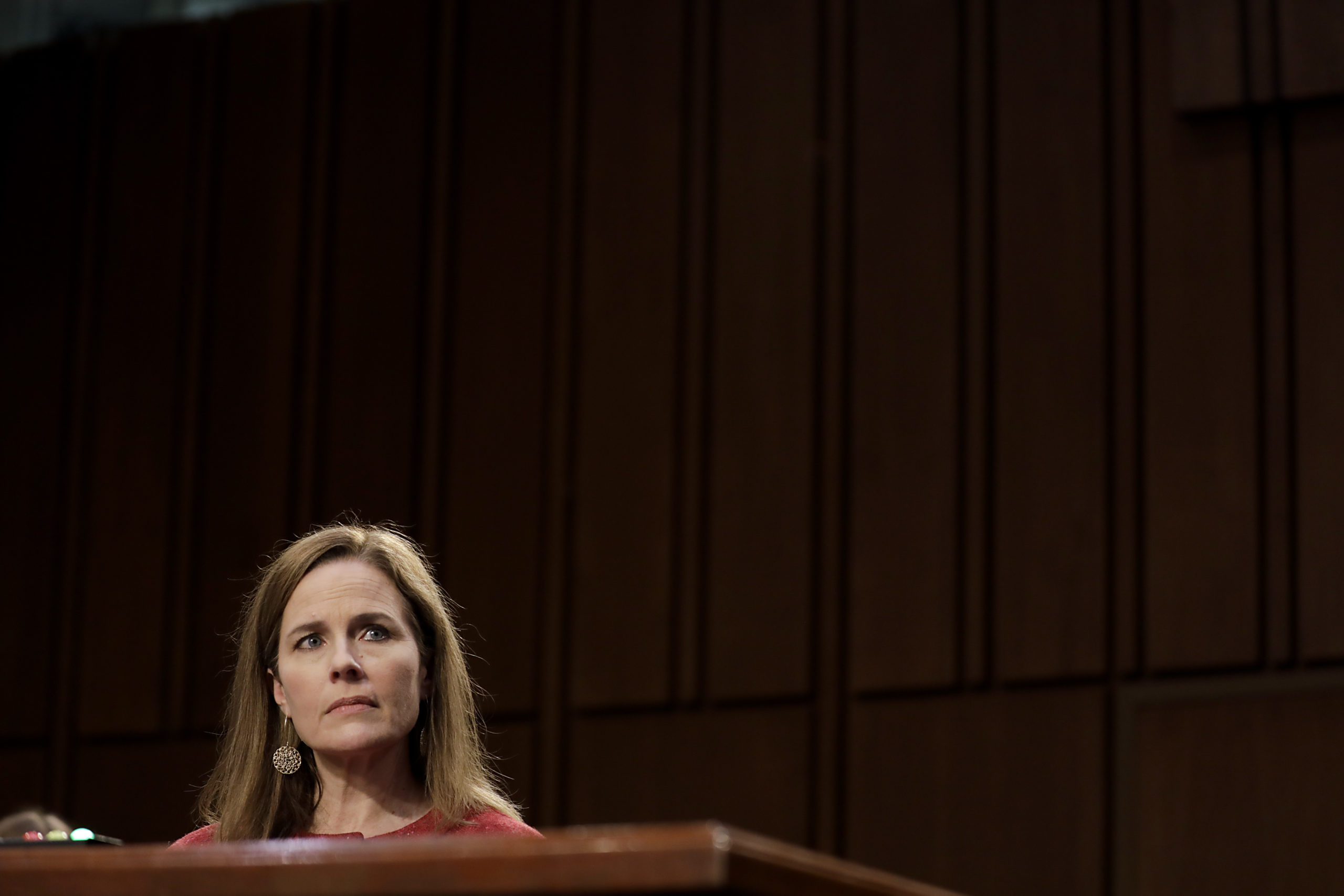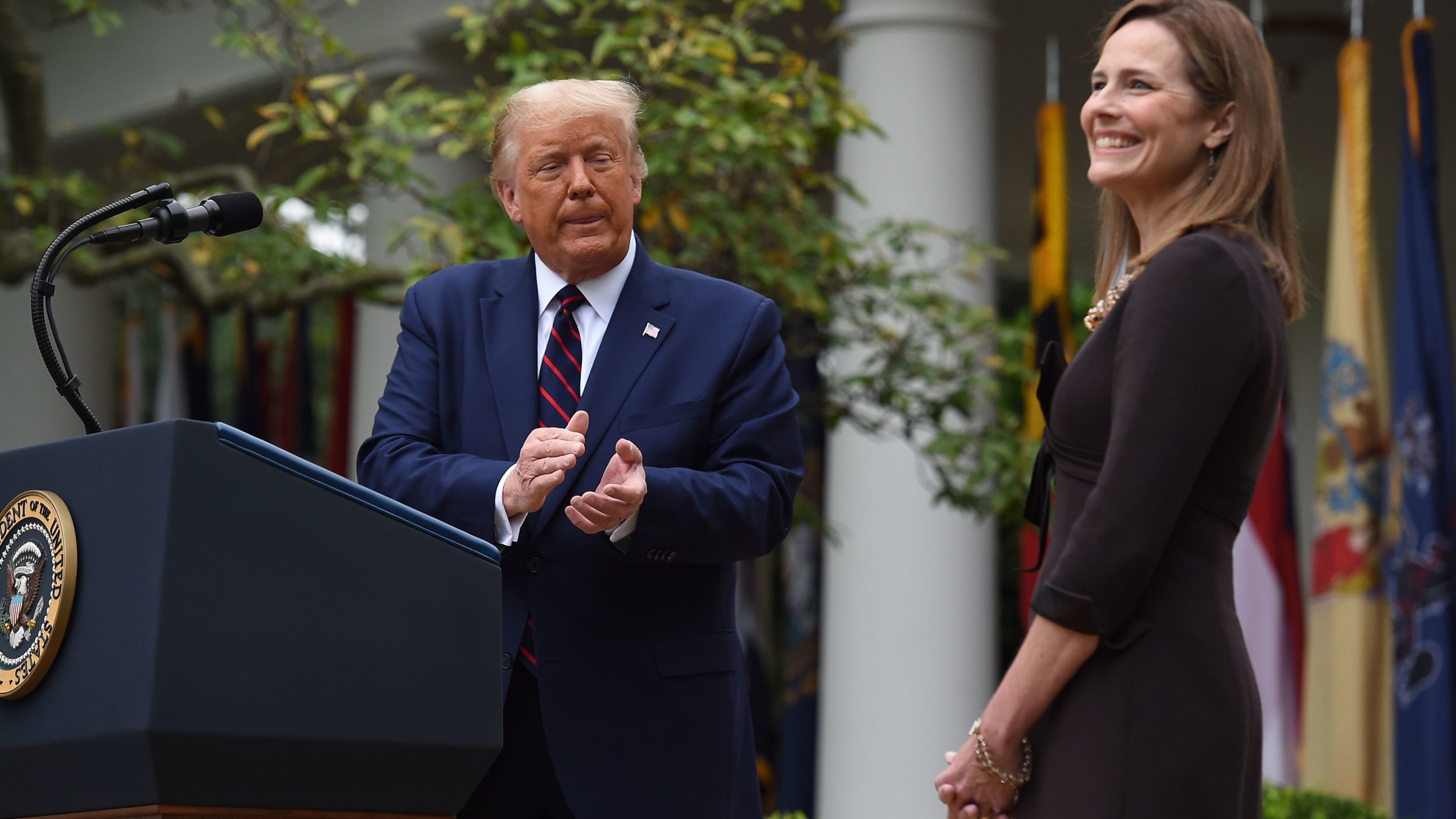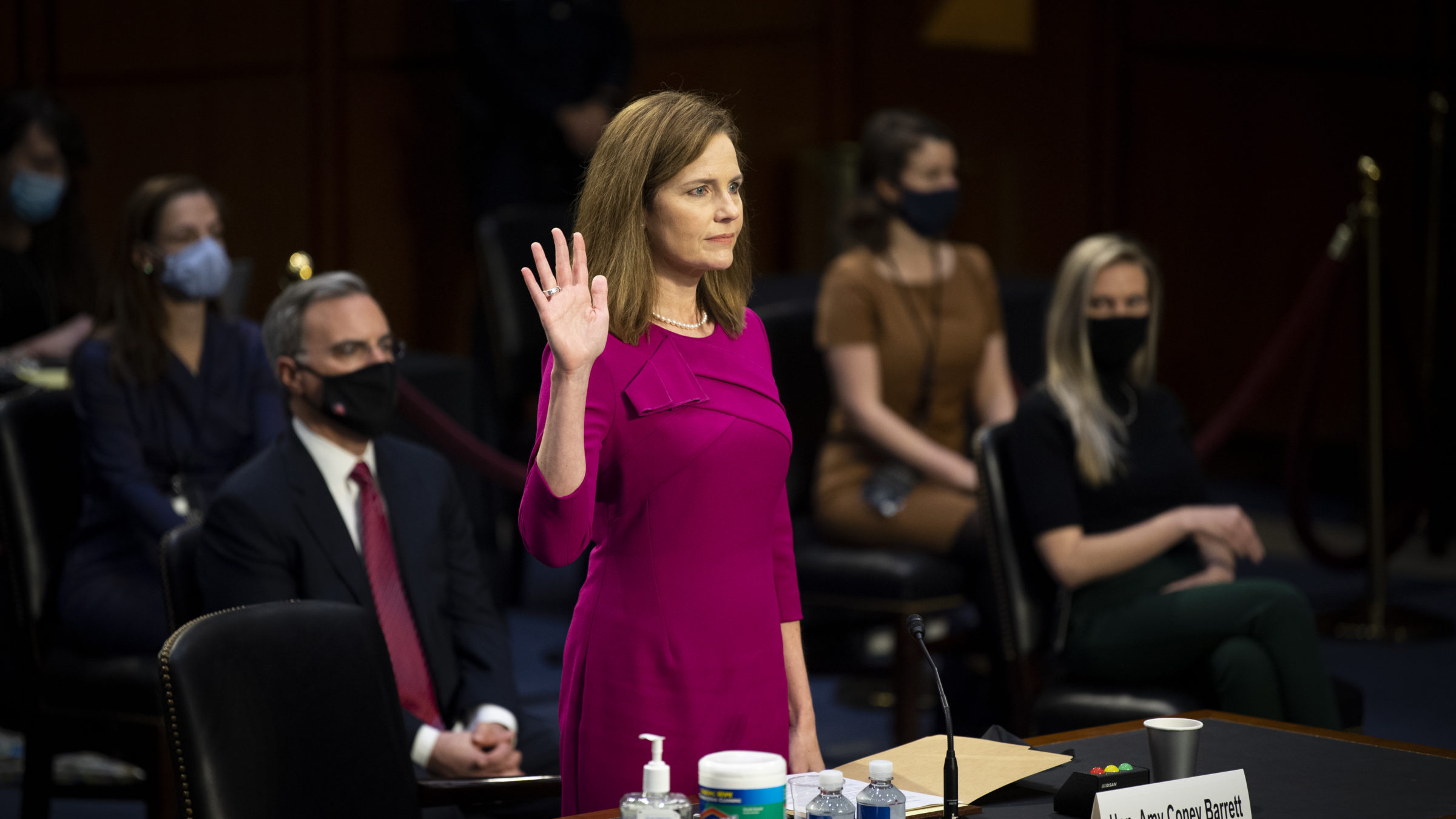As telegraphed by the recent leak of the draft opinion in Dobbs v. Jackson Women’s Health Organization, Justice Amy Coney Barrett is widely (and correctly) regarded as the Supreme Court’s decisive fifth vote to overturn Roe v. Wade later this month. And Barrett has already signaled to right-wing legal groups that she’s open to gutting far more than just Roe.
Despite what some conservative commentators might want you to think, many Supreme Court decisions that protect foundational civil liberties are on the constitutional chopping block. At her Supreme Court confirmation hearings in October 2020, Barrett even implied as much, refusing to say whether she believed that Griswold v. Connecticut, the case that held married couples had the constitutional right to purchase contraceptives for their own use, was correctly decided.
But Barrett’s disdain for civil liberties lies much deeper than just abortion and contraception. In any given case, Barrett will vote to uphold the most consistently reactionary interpretations of the Constitution. We know this because while she was a law professor at the University of Notre Dame, Barrett created and armed herself with a radical right-wing ideology that will let her overrule any case that conflicts with her policy preferences. She laid out this ideology over several law review articles she published while at Notre Dame, before her handpicked ascension to the Supreme Court.
Barrett’s law review articles—three published between 2013 and 2017, as well as others throughout her academic career—explain how an “originalist” like herself should deal with previously decided cases they disagree with. “Originalism” is the general idea that we should read the Constitution the same way the people who wrote it—the 18th-century slaveholders, genocidaires, and tax resisters—would have understood it. (In a wild coincidence, originalism gained prominence in conservative circles after the Court declared racial segregation unlawful in Brown v. Board of Education, when the right needed an acceptable way to advocate for segregation.) In Barrett’s words, originalism means that “the meaning of constitutional text is fixed at the time of its ratification,” and that that original meaning “is law” even today.
Already, this belief defies reality. If “the meaning of the constitutional text is fixed at the time of its ratification” and that meaning is the law, then people wouldn’t be enjoying detailed disclosures for publicly traded stocks or rivers that don’t catch on fire, courtesy of an administrative state that would have been unthinkable to the founders. But they are. The “original meaning” only becomes “the law” when the Court imposes it on an unwilling American public.

(Photo by Samuel Corum/Getty Images)
There is another, deeper problem, though, that even Barrett recognizes. Judges are supposed to respect the decisions of prior courts unless there’s a compelling reason to overturn the case. This principle is referred to as stare decisis—literally, “the thing has been decided.” It’s not an absolute rule, but the Court has repeatedly said that stare decisis is important so people can rely on its decisions and feel that those past decisions are fair.
This is a big problem for originalists. In the 20th century, the Supreme Court protected many rights Americans now view as fundamental, including the right to marry who you love, the right to contraception, Miranda rights, and so on. But as Barrett has acknowledged in multiple articles, if the Court were to take originalism seriously, they would need to not only overturn Roe, but also reverse Brown v. Board of Education, repeal all federal regulations, invalidate paper money (yes, really), abolish the state of West Virginia (again, really), and deratify the Fourteenth Amendment (seriously, we’re not kidding) as inconsistent with the Constitution.
So, in Barrett’s telling, stare decisis presents originalists with a crisis: Either abandon their core belief on how to interpret the Constitution, or “adhere to it at great (and in some cases, catastrophic) cost.” How can an originalist square this circle?
Barrett answers that we simply shouldn’t worry too much about stare decisis because the Court’s opinions merely offer one potential interpretation of the Constitution. In her view, “Americans largely look to the Court to flesh out the terms of our compact.” So when states try to advance previously fringe right-wing legal theories that fetuses are full-fledged human beings with full constitutional rights, Barrett thinks that’s just “a means of pushing back against the proposition that the Constitution embodies the principles the Court says it does.”
In her view, whether the public submits to the Court’s decisions or continues to litigate their merits—thus providing the Court with opportunities to reconsider—is highly relevant to whether the decisions are correct. Thus, Barrett says the presumption of stare decisis should be “weak” to more properly balance the Court’s relationship with the public “by leaving space for reargument.” You could call that “weak” stare decisis, or you could call that NOT stare decisis for cases Barrett disagrees with. Barrett goes with the first option.
Unsurprisingly, because Barrett believes the Court should accept that it can reconsider its prior constitutional decisions, she thinks the tie should go to originalism. In any case where the supposed “original public meaning” of the Constitution conflicts with a past decision, she says, “a justice’s duty is to the Constitution” and not to “a precedent she thinks clearly in conflict with it.”

(Photo by OLIVIER DOULIERY/AFP via Getty Images)
Today, as conservative as this Court is, it is not (yet) on the verge of overturning Brown, much to the chagrin of racists, or abolishing West Virginia, much to the chagrin of Pitt fans. That’s because cases like Brown are what law professors like to call “super-precedent.” University of North Carolina Law professor Michael Gerhardt defines super-precedent as decisions that have been so heavily reaffirmed and relied upon that their “correctness is no longer a viable issue for courts to decide.” Barrett similarly defines super-precedent as “the hard-to-dispute reality that regardless of whether they are right or wrong, some cases are so firmly entrenched that the Court would not consider overruling them.”
But pay attention to the phrase “regardless of whether they are right or wrong.” Barrett’s scholarly work repeatedly couches some of the most foundational decisions in constitutional law as settled only because the Court is not yet able to overturn them—because the Court, until now, has lacked enough good-hearted radical originalists who are willing to stand athwart history and say, “Go back! Go back!”
Despite the clear implications of originalism for those decisions, Barrett alleges the threat of overturning cases like Brown “is vastly overstated,” because the Court has “rules—some constitutional, some statutory, and some judicially adopted—[that] keep most challenges to precedent off the Court’s agenda.” For example, Barrett believes that since “the overruling of a super precedent is, by definition, unthinkable, a litigant is unlikely to spend resources litigating the point.” In theory, she says, if someone’s case relied on Brown being unconstitutional, the trial court would call their case obviously frivolous and kick it to the curb.
And even if some freak outlier case were to reach the Court, Barrett argues the Court wouldn’t need to touch it, because the justices have a lot of discretion over what cases they take. Beyond that, the Court imposes even more restraints upon itself after accepting a case; for example, how it “deems waived—and thus will not address—issues not raised in the courts below.”
Finally, if a justice ever is presented with an avenue to overturn a super-precedent, Barrett argues that justices have no obligation to answer a question that litigants don’t ask, especially when doing so would “cause chaos” the way overturning a super-precedent would. Barrett claims these roadblocks and the Court’s discretion keep the most troublesome cases out of the Court’s reach. Therefore, if someone tried to file a case to get the Court to do something disastrous like declare that Social Security is unconstitutional, the Court would never have to even entertain the question.
In sum, Barrett’s theory on how to balance originalism with stare decisis and super-precedent breaks down like this:
- The American public broadly agrees that super-precedents like Brown are good. Because of that, no one EVER sues over them.
- On the rare occasions people sue to overturn super-precedents, the underlying caselaw is so strong that any lower court judge hearing the case will swiftly kick it out of court.
- On the still-rarer occasion the case is not kicked out quickly, and the Court is presented with an opportunity to review a long-settled issue of law, the Court has multiple legal and procedural tricks up its sleeve they can use to avoid ruling on the issue if it wants to.
But what happens when the Court DOESN’T want to avoid ruling on an issue? What happens when a justice is nominated to the Court with the specific purpose of deciding a specific issue? Barrett’s writings presuppose plaintiffs are raising good-faith claims before a docile, self-restrained Court that only rules on the most limited basis necessary to resolve a given dispute. It never contemplates the way cases actually make it to the Court’s docket; for example, anti-choice activists spending decades infiltrating state and federal legislatures, teeing up blatantly unconstitutional anti-abortion laws just to present the Court with opportunities to relitigate Roe to extinction.
Beyond this willfully ignorant perception of how politically charged cases reach the Court, Barrett’s argument that super-precedent is not a problem for originalists suffers from several other compounding problems. Nothing about Barrett’s vision of super-precedent is tied to the merits of the decision itself. As noted above, Barrett says-without-saying that decisions commonly considered “super-precedent” like Brown are, from an originalist perspective, wrong as hell. Barrett’s definition of super-precedent isn’t an affirmative statement of the worthiness of a decision. It’s just a description of cases the public overwhelmingly agrees with, and a guess at how difficult it would be for the Court to engineer a reason to reverse them. Her definition leaves open the possibility that the Court could engineer that case, whether the public wants it or not.

(Photo by Caroline Brehman/CQ Roll Call)
Barrett’s conception of super-precedent is a self-fulfilling prophecy. If the public submits to the Court’s opinion, the decision becomes super-precedent simply because no one chooses to challenge it. Originalists can wave off concerns that the decision doesn’t comply with their ahistorical conception of the Constitution because no party before the Court will ever ask them to overrule it.
But if the Court’s opinion remains under attack by interested parties for extended periods of time, then (in Barrett’s mind) the public has NOT acquiesced, the decision is NOT super-precedent, and the Court needn’t worry about whether the decision is owed any special deference in the first place. If the Court wants to review the issue, and originalism demands overturning the case, nothing can or should stop the Court from doing so.
Barrett’s definition of super-precedent is therefore meaningless; it’s more of a long lament on how difficult it is to overturn certain cases than it is saying anything about the quality of the decisions. This balancing of precedent and originalism is not the scientific, historically sound view of the law originalists would have you believe. It’s lazy rhetoric for National Review bloggers to toss up in a Twitter post so the Court’s barbaric decisions can have some thin veneer of legitimacy.
Barrett’s weak commitment to a weak version of stare decisis allows her to reflexively advance her reactionary interpretation of the Constitution at every opportunity. Are there four more votes on this Supreme Court to overturn Miranda or Griswold? Maybe; no one’s asked them to do it yet. But as Barrett sees her duty as a Supreme Court justice, if the question comes before her, she’s already told us she can enact whatever she imagines the framers would have wanted, precedent be damned. Today, it’s abortion; soon, it’s everything else.


